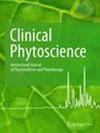乙酰胆碱酯酶抑制作用介导了莽草叶提取物对五带喙库蚊的杀幼虫活性
引用次数: 0
摘要
本研究旨在确定芒果叶提取物对抑制库蚊幼虫生长和变态的作用。生物测定指导萃取确定了生物活性部分,然后进行了气相色谱-质谱表征。通过给幼虫注射不同浓度的提取物,然后对死亡率进行 probit 分析,分析其杀幼虫活性。通过组织学分析和乙酰胆碱酯酶活性测定了解了对幼虫的形态和生理影响。结果表明,该提取物具有很高的杀幼虫活性,而 Dose50 为 225.158 ± 15.168,总 Chi-Square 为 13.09,P 值为 0.11。组织学研究显示,与对照组相比,研究对象的腹部组织完整性下降,出现了明显的畸变。研究还发现,该提取物能抑制乙酰胆碱酯酶的活性,LD 50 为 0.9512 µg/ml。这些研究结果可用于开发一种可作用于多个靶点的潜在杀幼虫剂。本文章由计算机程序翻译,如有差异,请以英文原文为准。
Acetylcholinesterase inhibition mediated the larvicidal activity of Mangifera indica extract against Culex quinquefasciatus
The study was formulated to identify the effect of Mangifera indica leaf extract in inhibiting the growth and metamorphosis of Culex quinquefasciatus larva. Bioassay-guided extraction identified the bioactive fraction, after which GC-MS characterized it. The larvicidal activity was analyzed by administrating extract in various concentrations and then subjecting the mortality rate for probit analysis. The morphological and physiological impact upon larvae was understood by histological analysis and acetylcholinesterase activity assay. The results suggested that the extract possessed a high degree of larvicidal activity, whereas the Dose50 was 225.158 ± 15.168 with a Total Chi-Square of 13.09 and p-value of 0.11. The histological studies revealed notable aberrations among the study subjects compared to the control group due to diminished abdominal tissue integrity. It was also observed that the extract could inhibit the acetylcholinesterase activity, with an LD 50 of 0.9512 µg/ml. The observations made in these studies may be utilized to develop a potential larvicidal agent that could act upon multiple targets.
求助全文
通过发布文献求助,成功后即可免费获取论文全文。
去求助
来源期刊
自引率
0.00%
发文量
18
审稿时长
13 weeks
期刊介绍:
Clinical Phytoscience is an international, peer-reviewed, interdisciplinary, and open access journal publishing high quality research articles on clinical evidence and use of medicinal plants in the development of efficient and well tolerated phytotherapy. Clinical Phytoscience focuses on phytotherapy, looking at proof of concept, efficacy and safety, to be established “at eye level” compared to pharmacotherapy. The emphasis lies on application oriented topics (efficacy and safety of phytotherapy in a specific indication, including its need and acceptance by the patient). The scientific results published in the journal should contribute to the recovery and maintenance of human health by phytotherapy. Clinical Phytoscience will publish high-quality evidence-based clinical studies and relevant pharmacological studies. Key areas of interest are: -Upper and lower airways, ENT and pneumology -Gynecology -Urology -Nephrology Pediatrics -Intestinal tract -Hepatology -Diabetes/metabolic Syndrome -Immunology and microbiology -Hygiene -Analytics

 求助内容:
求助内容: 应助结果提醒方式:
应助结果提醒方式:


